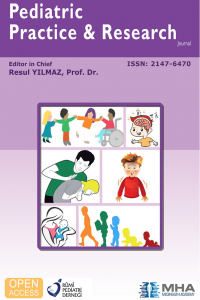Gastroenterit Tanısı İle Hastanemize Başvuran Pediatrik Hastalarda Blastocystis Spp. Varlığının Araştırılması
Gastroenterit Tanısı İle Hastanemize Başvuran Pediatrik Hastalarda Blastocystis Spp. Varlığının Araştırılması
Parasitic positivity was found in 739 (6,48%) out of 11393 stool specimens of pediatric patients. Blastocystis spp. was found in 233 (31.5%) of the positive samples. Of the pediatric patients who were positive for Blastocystis spp., 109 (46.7%) were male, 124 (53.2%) were female and 94.4% were polyclinics and 5.6% were service patients. In 66 cases (28.3%) only Blastocystis spp., in 165 (70.8%) Blastocystis spp. and Entamoeba spp., in one of the samples Blastocystis spp. and Dientamoeba fragilis (0.4%) and in one Blastocystis spp., Entamoeba spp. and Dientamoeba fragilis ( 0.4%) together was determined. Conclusion: It was concluded that Blastocystis spp. and Entamoeba spp. were the most common parasitic agents and it was found that the patients infected with these parasites were mostly found in patients admitted to the Pediatric Emergency Department (48%). Blastocystis infections show different clinical picture in each patient. Some of the Blastocystis subtypes are thought to be pathogenic and some are non-pathogenic and therefore, new scientific studies are needed to determine the relationship between parasite and pathogenicity.
Keywords:
Blastocystis gastroenterit, çocuk hastalar,
___
- References: 1. Almeida IA, Jeske S, Mesemburg MA, Berne MEA, Villela MM. Prevalence of and risk factors for intestinal parasite infections in pediatric patients admitted to public hospitals in Southern Brazil. Rev Soc Bras Med Trop 2017; 50(6):853-6. 2- Stensvold CR, Clard CG. Molecular Identification and Subtype Analysis of Blastocystis. Curr Protoc Microbiol. 2016; 18;43:20A.2.1-20A.2.10. 3- Tan KSW. "New insights on classification, identification, and clinical relevance of Blastocystis spp." Clinical microbiology reviews 2008; 21(4): 639-65. 4- Ertuğ S, Malatyalı E, Ertabaklar H, et al. Aydın ilinde elde edilen Blastocystis izolatlarının alt tip dağılımı ve klinik semptomların değerlendirilmesi. Microbiyol Bul 2015;49: 98-104. 5. Fadime E. Blastocystis’in moleküler epidemiyolojisi. Dicle Med J 2015;42(4): 541-5. 6. Yoshikawa H, Iwamasa A. Human Blastocystis subtyping with subtype-specific primers developed from unique sequences of the SSU rRNA gene. Parasitol Int 2016;65(6): 785–91. 7. Tunalı V, Akdur Öztürk E, Ünver A, Turgay N. The Prevalance of Blastocystosis among Patients with Gastrointestinal and Dermatologic Complaints and Effects of Blastocystis spp. Density on Symptomatology. Turkiye Parazitol Derg 2018; 42(4): 254-7. 8. Toro Monjaraz EM, Vichido Luna MA, Montijo Barrios E et al. Blastocystis hominis and Chronic Abdominal Pain in Children: Is there an Association between Them? J Trop Pediatr 2018;64(4): 279–83. 9. Bogumiła Skotarczak. Genetic diversity and pathogenicity of Blastocystis. Ann Agr Env Med 2018;25(3): 411–6.
- ISSN: 2147-6470
- Başlangıç: 2013
- Yayıncı: MediHealth Academy Yayıncılık
Sayıdaki Diğer Makaleler
Gülüzar GÜRHAN, Bülent ATAŞ, Mesut PİŞKİN
Tips in The Development of Family Central Care
Relationship Between Retinopathy Severity And Average Thrombocyte Volume Purpose:
Ayşe Demet ŞAHİN, Saime Sundus UYGUN
Two Cases With Tyrosine Kinase 2 Deficiency :
Çocuk Yoğun Bakım Ünitemizde Trakeostomi Deneyimlerimiz
Sosyal Fobi Nedeni İle Meydana Gelen Senkop Ciddi Ventriküler Aritminin Bir Göstergesi Olabilir
Ahmet Emre HATIR, Sevgi PEKCAN
Epikardiyal Kalp Pili Takılmış Klinik Olarak Normal Bir Çocukta Holter Monitörizasyonun Önemi
